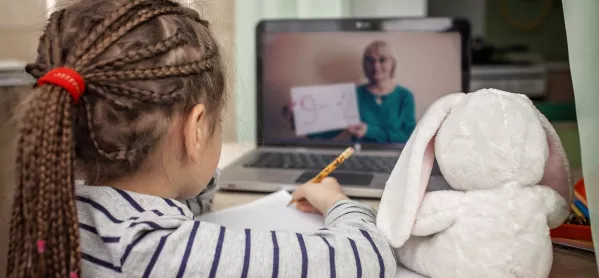- Home
- 700,000 pupils ‘miss learning due to lack of internet’
700,000 pupils ‘miss learning due to lack of internet’

Politicians, education leaders and charity heads have called on the government to ensure that children eligible for free school meals have internet access at home.
More than 40 senior figures, including former education secretaries and several charity representatives, have urged the government to provide internet access to 1.3 million disadvantaged pupils, in an open letter.
During the coronavirus pandemic, many organisations have raised concerns that the attainment gap between pupils from poorer backgrounds and their wealthier peers has grown, in part because of a lack of access to technology.
Coronavirus: DfE won’t say who will get free laptops
Background: Free laptops for disadvantaged pupils
Exclusive: National edtech hub ‘needed to close gap’
Many lessons and other school activities have been moved online while schools are closed to the vast majority of pupils.
However, today’s letter warns that at least 700,000 disadvantaged children have missed out due to a lack of computer or internet access and cannot complete their homework.
Coronavirus: Disadvantaged pupils ‘need internet access’
Around 15 per cent of teachers told the Sutton Trust social mobility charity that more than a third of their pupils did not have access to an electronic device to learn from home.
The letter has been signed by politicians including former prime minister Tony Blair, former education and employment secretary Lord Blunkett and Tim Loughton, a Conservative MP who chairs the All-Party Parliamentary Group for Children and is a former children’s minister.
Layla Moran, the Liberal Democrats’ education spokeswoman, has also signed the letter, in addition to former head of Ofsted Sir Michael Wilshaw and charity leaders including Action for Children chief executive Melanie Armstrong.
The letter reads: “This policy is not a silver bullet. It will not fully close the digital divide or make up for months away from school.
“But it would make an immediate, tangible difference to some of the most vulnerable families in our society.”
Lead signatory Siobhain McDonagh, Labour MP for Mitcham and Morden, will present a bill in Parliament today calling for all children eligible for free school meals to be provided with a broadband connection and equipment.
She said: “The lockdown has exposed the digital divide in our society, with schools across the country reporting struggling families who do not have internet access at home.
“Those children who can’t access the same resources as their classmates will find themselves even further behind when they finally return.
“Some may never catch up.”
The NAHT school leaders’ union said a recent survey showed that 70 per cent of secondary school leaders who had requested internet access for their disadvantaged students had not received it.
General secretary Paul Whiteman said: “While schools have begun a phased return for some primary pupils, the majority of children are still learning from home, and are likely to continue to do so in one form or another for some time to come.
“Internet access and digital devices are therefore still crucial, and a relatively easy way for the government to make a difference to many pupils’ ability to learn.”
Education secretary Gavin Williamson previously told the House of Commons that 230,000 laptops would be given to disadvantaged children by the end of June.
Tens of thousands of routers have also been provided to vulnerable families, he also told MPs.
A Department for Education spokesman said: “We will do whatever we can to make sure no child, whatever their background, falls behind as a result of coronavirus.
“The government has already committed over £100 million to support children to learn at home, and pupil premium funding at the highest ever rate per pupil continues to be paid to help schools support their disadvantaged pupils.
“Many schools have begun welcoming children from Reception, Year 1 and Year 6 back to the classroom as part of a phased and cautious approach.
“We are also working with a range of partner organisations to deliver the support that is needed for all pupils who have been affected by school closures.”
Keep reading for just £1 per month
You've reached your limit of free articles this month. Subscribe for £1 per month for three months and get:
- Unlimited access to all Tes magazine content
- Exclusive subscriber-only stories
- Award-winning email newsletters



